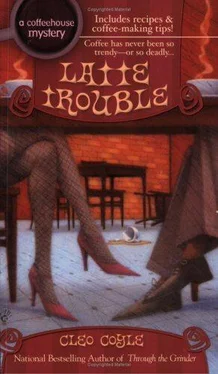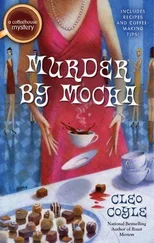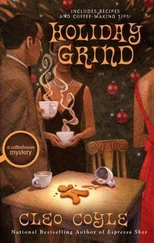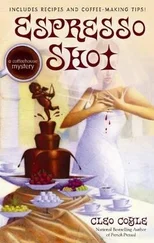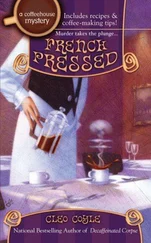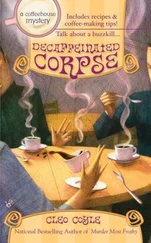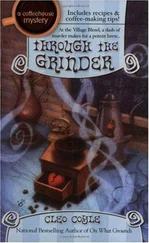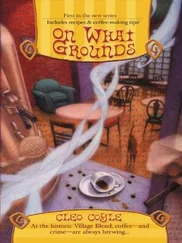Клео Коул - Latte Trouble
Здесь есть возможность читать онлайн «Клео Коул - Latte Trouble» весь текст электронной книги совершенно бесплатно (целиком полную версию без сокращений). В некоторых случаях можно слушать аудио, скачать через торрент в формате fb2 и присутствует краткое содержание. Год выпуска: 2005, ISBN: 2005, Издательство: Berkley, Жанр: Детектив, на английском языке. Описание произведения, (предисловие) а так же отзывы посетителей доступны на портале библиотеки ЛибКат.
- Название:Latte Trouble
- Автор:
- Издательство:Berkley
- Жанр:
- Год:2005
- ISBN:978-0425204450
- Рейтинг книги:3 / 5. Голосов: 1
-
Избранное:Добавить в избранное
- Отзывы:
-
Ваша оценка:
- 60
- 1
- 2
- 3
- 4
- 5
Latte Trouble: краткое содержание, описание и аннотация
Предлагаем к чтению аннотацию, описание, краткое содержание или предисловие (зависит от того, что написал сам автор книги «Latte Trouble»). Если вы не нашли необходимую информацию о книге — напишите в комментариях, мы постараемся отыскать её.
Latte Trouble — читать онлайн бесплатно полную книгу (весь текст) целиком
Ниже представлен текст книги, разбитый по страницам. Система сохранения места последней прочитанной страницы, позволяет с удобством читать онлайн бесплатно книгу «Latte Trouble», без необходимости каждый раз заново искать на чём Вы остановились. Поставьте закладку, и сможете в любой момент перейти на страницу, на которой закончили чтение.
Интервал:
Закладка:
Thirteen
As I followed Madame out of the cab in front of Pier 18, Matteo was waiting on the sidewalk. He spied his mother, then did a double-take.
“It’s Jackie O!” he cried.
“We’re calling her Margot Gray, this evening,” Madame whispered. “You remember Margot and her husband Rexler, from Scarsdale? We saw a lot of them when you were a teenager.”
Matteo grinned. “I remember their daughter much better.”
“You are incorrigible,” his mother replied. She took her son’s arm. As darkly handsome as ever, he had abandoned the black Armani tonight for a more approachable look—a cream V-neck sweater outlined his athletic, broad-shouldered torso beneath a caramel-colored camel-hair jacket and chocolate brown pants.
“Son, tell me about this business venture of yours. Margot has been quite evasive about the subject.”
Matt’s uneasy gaze attempted to find mine through the oversized tinted tortoiseshell glasses.
“I haven’t been evasive,” I protested. “I haven’t said a word.”
“I was hoping you’d be surprised by my presentation, mother,” he said smoothly, “pleasantly surprised.” He glanced at his watch. “Maybe we’d better get to the dock. We wouldn’t want the boat to leave without us.”
We moved through a sheltered space to the dock area where signs directed us to Tad Benedict’s seminar. At the gangplank, a table was set up to greet potential investors. A blond woman in a Fen pantsuit and one of Lottie Harmon’s coffee swirl brooches on her jacket lapel took our invitations and wrote down our names and addresses.
“Margot Gray of Scarsdale,” I said in a nasal drone that I thought sounded suitably snobbish. The woman wrote down my name and fictitious address, then handed me a spiral bound prospectus. On the cover were the words “TB Investments.” Perched on the lettering was a spot of art that looked like a butterfly—or was it a moth?
“Welcome aboard the Fortune ,” Clipboard Lady said in a faux-friendly tone. “When you go up the gangplank, make a right. In the main ballroom cocktails are being served.”
The Fortune was a dazzlingly white seventy-five-foot pleasure yacht transformed into a Hudson River sightseeing and party boat. The entire superstructure below the boxy pilot house was glass-enclosed, offering a panoramic view of the New York skyline. From the deck, the view was impressive. The sun had already set, and the lights of midtown Manhattan reached into the clear evening sky. I’d had to push my dark glasses down to the tip of my nose just to make it out.
The grandly named main ballroom was basically a carpeted space approximately the size of a two-car garage—a crowd circled a table of hors d’oeuvres and a well-stocked bar, where a young bartender deftly mixed adult beverages to order. I asked the man for a Long Island iced tea (for courage), which I sipped judiciously as I moved among the group.
The forty or so people were mostly in their fifties and sixties and mostly paired up. Many of the older men were displaying, on their arms, young, blond trophy wives (Tom Wolfe’s “Lemon Tarts”); a good many older women were chatting in small clusters; and two gay May/September couples had gravitated to each other. A few quite elderly investors had come, as well, including a rather imperious man in a wheelchair who seemed to take pleasure in ordering his nurse to fetch him drink after drink.
I saw no sign of Tad Benedict, but the chic, faux-smiling blond who’d signed us in appeared with her clipboard under her arm. I watched her tap Matteo on his shoulder, then crook her finger and lead him through a bulkhead door behind the bar, which was where, I presumed, the entrepreneurs with start-ups to pitch (i.e., the debutantes of this gala) were probably being prepped by Tad.
I began my snooping with a study of the people in the room. The rich, to paraphrase F. Scott Fitzgerald, are very different from us (“they have money”), and that legendary observation held true for this affluent flock. In my experience, any other social gathering of this size—even one packed with total strangers—would become somewhat lively as copious amounts of expensive liquor were being consumed. But not this bunch. Even as they imbibed, the group wondered about, leafing through Tad Benedict’s prospectus, looking a little lost.
“They’re all so quiet,” I whispered to Madame.
“Yes, my dear. Well, some people are just used to letting their money speak for them, and in my opinion, money alone has absolutely nothing to say.” She smiled, leafing through Tad’s prospectus. “Look at these obviously high-risk investment opportunities: a new restaurant, an independent film. Why do you think these people are here, Clare? Not for money. They have that. What they don’t have is excitement. They’re bored, you see. These start-ups are the kind of thing that makes them feel they are participating in the world.”
I couldn’t fault Madame’s slightly disdainful attitude—because I knew where it came from. She may have married a wealthy second husband, but she’d spent decades running the Blend—initially with Matt’s father and then by herself. It was hard, disciplined work running any business, rising at dawn every day, tracking and checking up on thousands of details, wrangling employees. And, over the years, Madame had done much more than simply roast and pour coffee for the people in the neighborhood. She’d become intimately involved in the lives of many of the people who’d come through the Blend’s door—the actors, artists, writers, dancers, and musicians who’d always populated Greenwich Village—giving them the Blend’s second floor couch to sleep on when they’d been evicted from their cramped studio apartments, pouring black French roast for the borderline alcoholics, holding the hands of emotionally fragile souls who’d come to one of the most brutal cities on earth to peddle their talents. So, it didn’t surprise me that Madame wouldn’t think much of a group of people who simply wanted to throw money at a business to feel as though they were a part of it. In Madame’s experience, blood, sweat, and tears made you a part of something, not simply placing ink on a check.
I felt the deck rumble under my heeled boots as the engine roared to life. Then the yacht bumped, sloshing the drink in my hand, and a moment later, a deckhand cast the mooring lines aside and we pulled away from the pier. The boat moved along the Manhattan skyline, its towers of lights shimming in the Hudson’s dark waters.
Speakers crackled, and an amplified voice filled the room. “A million lights. A million stories. A million opportunities for those who know how to find them, use them. My name is Tad Benedict, and I can show you how. You can participate in a number of ways—put a little bit down on every opportunity I will offer tonight. Or you might want to invest only in a single start-up…that’s up to you. There are no losers here, I assure you. The amount you gain depends on how aggressively you choose to invest….”
The interior lights dimmed, and everyone turned to face Tad Benedict. The stocky man with the elfin face stood in the center of a white spotlight, microphone in hand.
“Thank you all for coming,” he continued. “I thank you now because I can afford to be generous. Why? Because I know you are all going to thank me later.”
Then Tad launched into a spiel that was one third Tony Roberts can-do optimism, one third Wall Street get-rich-quick pep talk, and one third awkward metaphors—basically a lot of drivel about flames and moths being drawn to them, which explained the logo on the prospectus, at least. I had always found Tad Benedict likeable, but the result of this bizarre combination was bullish—and not in a good way.
Читать дальшеИнтервал:
Закладка:
Похожие книги на «Latte Trouble»
Представляем Вашему вниманию похожие книги на «Latte Trouble» списком для выбора. Мы отобрали схожую по названию и смыслу литературу в надежде предоставить читателям больше вариантов отыскать новые, интересные, ещё непрочитанные произведения.
Обсуждение, отзывы о книге «Latte Trouble» и просто собственные мнения читателей. Оставьте ваши комментарии, напишите, что Вы думаете о произведении, его смысле или главных героях. Укажите что конкретно понравилось, а что нет, и почему Вы так считаете.
